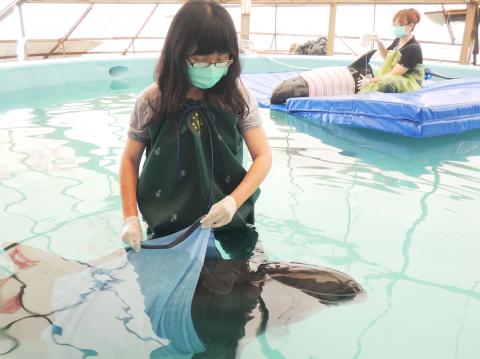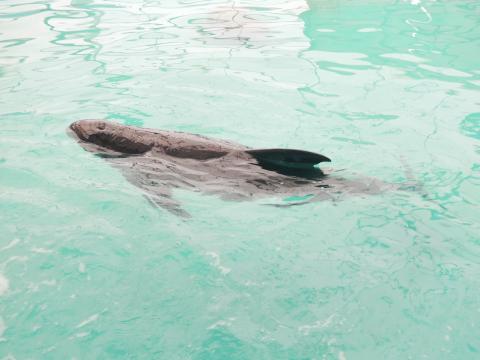A rescued pygmy killer whale that beached on the coast of Pingtung County in April was released back to the sea last week after a record 66 days of rehabilitation involving the efforts of more than 1,000 volunteers.
The release of “A-Gan” (阿淦), a male pygmy killer whale (Feresa attenuata), was another notable success for National Cheng Kung University’s renowned Marine Biology & Cetacean Research Center.
Since 2000, the center has earned an outstanding international reputation after rescuing and rehabilitating 36 stranded dolphins and whales and successfully releasing five of them back into the wild.

Photo: Tsai Wen-chu, Taipei Times
Thanks to these success stories, the center has enhanced Taiwan’s international standing in terms of marine conservation work.
According to the center’s director, Wang Chien-ping (王建平), Taiwan and Japan are the leading countries in Asia in terms of experience and attaining results in scientific research into dolphins and whales.
As for rescuing the marine mammals, Wang said Taiwan is more successful and has put in more effort than Japan.

Photo: Tsai Wen-chu, Taipei Times
“A-Gan’s” pod of pygmy killer whales were found beached on the coast of Chechen Township (車城) on April 14.
After being alerted, volunteers from the Marine Biology & Cetacean Research Center worked through the day to save and help revive six of the whales.
Wang said that of the six whales rescued that day, three died afterward. Two healthy whales were released back to the sea four days later.
The remaining whale was given the name “A-Gan” by volunteers, and was brought back for rehabilitation at the center’s facilities in Sihcao (四草), Greater Tainan.
Wang said that because “A-Gan” had sustained an external injury and had lung and liver problems, he was unable to ingest food or swim.
He recalled it took a lot of effort to save “A-Gan,” as the center needed volunteers around the clock to carefully handle and protect him.
Wang said that when he arrived, the pygmy killer whale was 133kg, but his weight fell to 117kg at one time, before recovering to 122.5kg as he returned to full health.
After the whale began feeding normally — up to 8.5kg of fish food per day — experts judged that “A-Gan” was ready to be released into the wild.
“A-Gan” needed 66 days of rehabilitation, with a total of more than 1,000 volunteers offering round the clock care, as he surpassed the center’s previous record of 64 days of rehabilitation, for a bottled-nose dolphin, last year.
For all its success and international recognition, Wang said that the center is severely under-funded, with an annual working budget of only about NT$1 million (US$33,000) and relies on the hard work and selflessness of volunteers.
Much of the center’s funding comes from Wang himself, and he has even taken out bank loans to sustain its operation.
“We are not only the first in Asia for rescuing dolphins and whales, we are the first in Asia in terms of lack of resources,” one volunteer worker said.
“The average cost of rescuing one marine mammal is NT$600,000. With our annual funding of only NT$1 million, in theory, we can rescue two a year at best,” the volunteer said.
“However, so far this year, our center has rescued nine animals. So you can see expenses far outstrip the available funds,” the volunteer said.
“Besides Taiwan and Japan, in recent years, China has started to get involved in marine mammal rescue,” Wang said.
“They have invested a large amount of money to build up their facilities, and are catching up to Taiwan, but their experience in rescue and rehabilitation still lags far behind us,” he said.
The center has organized donation drives in the past, but with disappointing results. This leads Wang and the center’s volunteers to feel that, “in terms of soliciting public donations, rescuing dolphins and whales fares far worse than saving stray dogs.”
For the overall 66-day effort to rehabilitate “A-Gan”, Wang pointed out that the center had to bear much of the expense.
“It costs money to buy boxed meals for volunteers. It also costs money for the rescue vehicles, for the towing and winching machinery, and for the capelin fish to feed the whale,” he said.
“The vehicle used to haul ‘A-Gan’ to sea cost NT$14,000 to rent, and we still do not know how to pay for it,” Wang said.
The volunteers jokingly pointed to the rescued pygmy killer whale.
“He is the guy who’s eaten up all our center’s money,” they said.

The High Prosecutors’ Office yesterday withdrew an appeal against the acquittal of a former bank manager 22 years after his death, marking Taiwan’s first instance of prosecutors rendering posthumous justice to a wrongfully convicted defendant. Chu Ching-en (諸慶恩) — formerly a manager at the Taipei branch of BNP Paribas — was in 1999 accused by Weng Mao-chung (翁茂鍾), then-president of Chia Her Industrial Co, of forging a request for a fixed deposit of US$10 million by I-Hwa Industrial Co, a subsidiary of Chia Her, which was used as collateral. Chu was ruled not guilty in the first trial, but was found guilty

‘DENIAL DEFENSE’: The US would increase its military presence with uncrewed ships, and submarines, while boosting defense in the Indo-Pacific, a Pete Hegseth memo said The US is reorienting its military strategy to focus primarily on deterring a potential Chinese invasion of Taiwan, a memo signed by US Secretary of Defense Pete Hegseth showed. The memo also called on Taiwan to increase its defense spending. The document, known as the “Interim National Defense Strategic Guidance,” was distributed this month and detailed the national defense plans of US President Donald Trump’s administration, an article in the Washington Post said on Saturday. It outlines how the US can prepare for a potential war with China and defend itself from threats in the “near abroad,” including Greenland and the Panama

DEADLOCK: As the commission is unable to forum a quorum to review license renewal applications, the channel operators are not at fault and can air past their license date The National Communications Commission (NCC) yesterday said that the Public Television Service (PTS) and 36 other television and radio broadcasters could continue airing, despite the commission’s inability to meet a quorum to review their license renewal applications. The licenses of PTS and the other channels are set to expire between this month and June. The National Communications Commission Organization Act (國家通訊傳播委員會組織法) stipulates that the commission must meet the mandated quorum of four to hold a valid meeting. The seven-member commission currently has only three commissioners. “We have informed the channel operators of the progress we have made in reviewing their license renewal applications, and

A wild live dugong was found in Taiwan for the first time in 88 years, after it was accidentally caught by a fisher’s net on Tuesday in Yilan County’s Fenniaolin (粉鳥林). This is the first sighting of the species in Taiwan since 1937, having already been considered “extinct” in the country and considered as “vulnerable” by the International Union for Conservation of Nature. A fisher surnamed Chen (陳) went to Fenniaolin to collect the fish in his netting, but instead caught a 3m long, 500kg dugong. The fisher released the animal back into the wild, not realizing it was an endangered species at